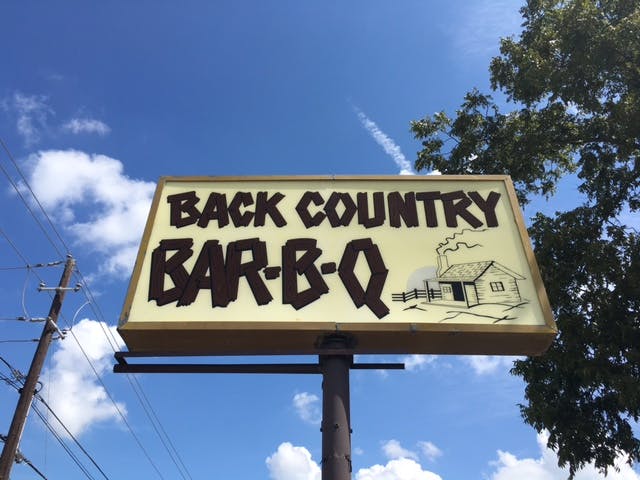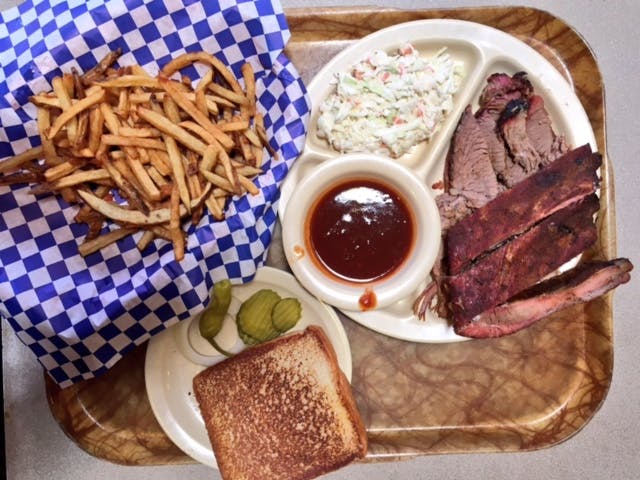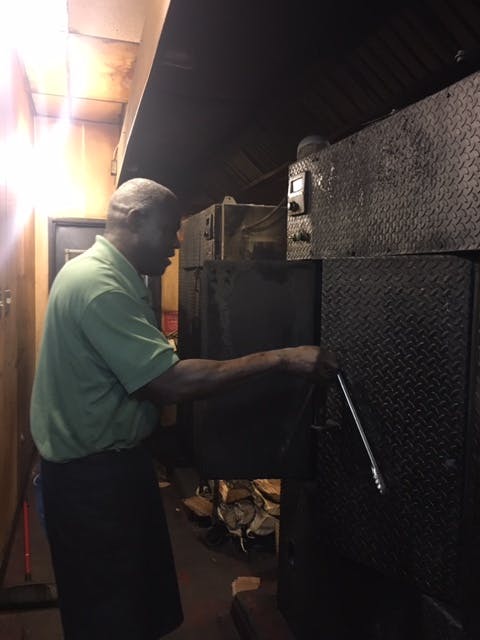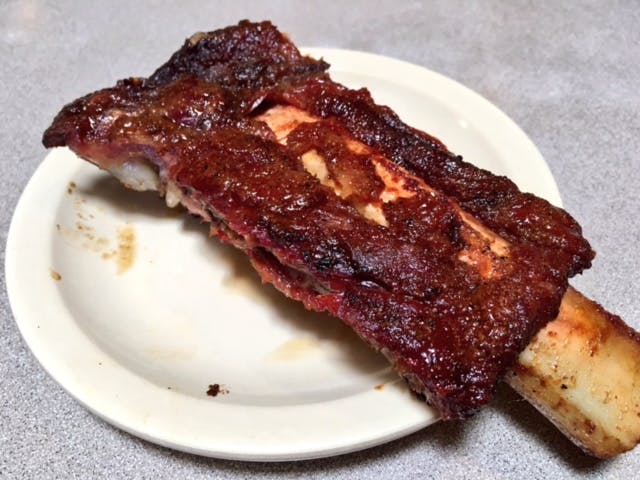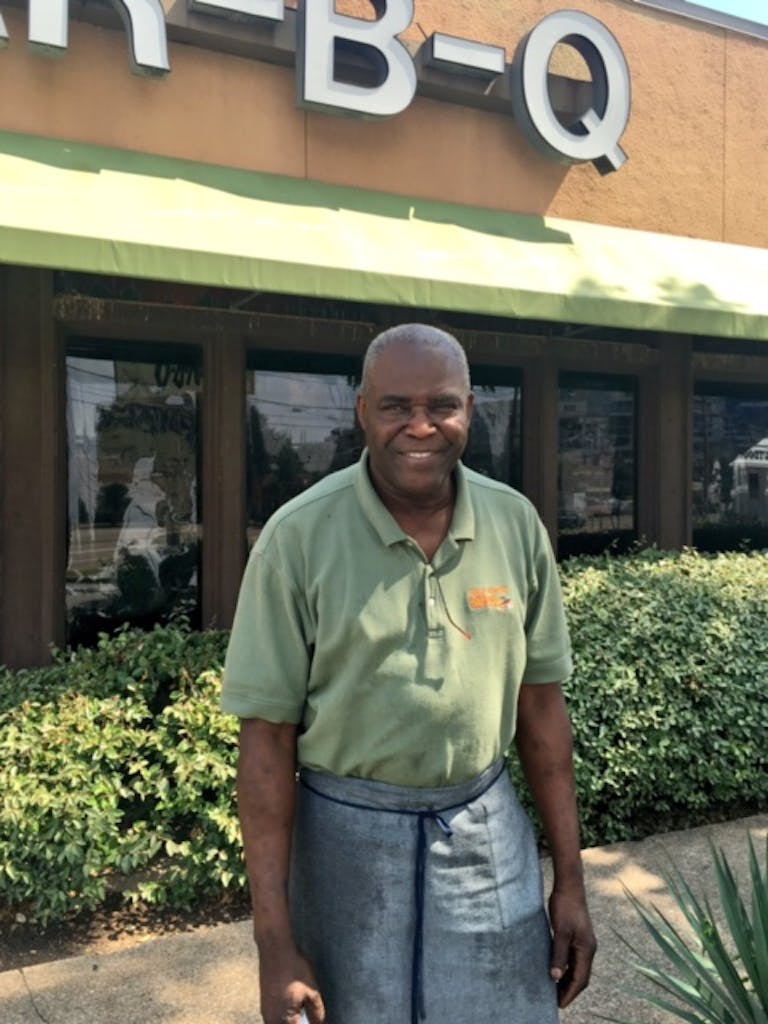 Pitmaster: Back Country Bar-B-Que; Opened 1975
Pitmaster: Back Country Bar-B-Que; Opened 1975
Age: 62
Smoker: Wood-Fired Rotisserie Smoker
Wood: Hickory
Earnest Griffith Sr. has been cooking barbecue in Dallas for 42 years. He started in downtown Dallas in 1970, when the area was teeming with workers in need of lunch. This was before the days of the downtown tunnels, which began construction in the mid-1970’s, and barbecue was a popular option. Griffith’s employer, Joe Moseley, had four locations there, two of which were just a block apart. Griffith gained not only cooking skills there, but also learned how to work the cutting block and serve his customers.
Griffith grew up in South Dallas, and it wasn’t an easy upbringing. The tragedy of his brother’s murder when Griffith was only sixteen was almost too much to bear, until he had his life re-directed by a new wife and child. In an effort to support his family, he turned to barbecue and never left.
Griffith used the skills he learned at Moseley’s to secure a job at the brand new Back Country Bar-B-Que when it opened in 1975. After a new owner took over this year, Griffith is still in charge of the barbecue and the chopping block, so he’ll be the one taking your order when you walk in the door. Ask him what’s good. He’ll probably tell you it’s all great.
Daniel Vaughn: You’ve been with Back Country Bar-B-Que since it opened. Did you work in barbecue before then?
Earnest Griffith Sr.: Yes. I started at Joe Moseley’s Barbecue.
DV: Where was that?
EG: Where Thanksgiving Square is now, at Pacific and Ervay. We also had one on the next block. There was a Shoemaker’s Barbecue between us. We had four locations downtown. Old man Moseley was 74 years old, and he said, “Earnest, let me tell you something about this business. Never say anything about another man’s barbecue, because there’s somebody who thinks that’s the best they ever had.” I just don’t go in anybody else’s barbecue place. I haven’t been to another barbecue place in forty-something years, but if you open one too close to me, I’ll send the guys over there to get a pound of ribs and a pound of beef just to see what we’re working with.
DV: When you were downtown, did the two joints a block apart have different hours?
EG: Nope. That was in the seventies. Back then, downtown was busy. You couldn’t open enough eating places. When the eighties came it just died.
DV: How old were you when you started cooking barbecue?
EG: I was sixteen. I would get out of school and go down there. My mother worked there. I made the mistake of getting my wife pregnant very early. We met when I was fifteen and she was fourteen. By the time I was seventeen we had a kid coming. I knew then I was going to have to go to work. I was a mess.
DV: Did you get married?
EG: I did, and I’m still with my wife today, Evelyn Griffin. I credit my wife with everything that I’ve done, because I could have gotten in a lot of trouble after they killed my brother. He got killed when I was sixteen. He was seventeen. I was a basket-case.
DV: What happened?
EG: He was at the store. The man that shot him was 47 years old. He was 17, but he was 6’-3”. Three weeks before the man had hit one of my aunts, and my brother beat him up. His name was Leroy. He worked at the store, and my brother asked for some cigarettes. They were up over Leroy’s head. He put a pack on the counter. By brother paid for it and reached for the pack, but knocked it back behind the counter. My brother told the clerk he dropped his cigarettes, and the clerk said “I gave you your cigarettes.” There was an argument. My brother reached up and grabbed a pack and started out the door. Leroy called him by his name, and he turned around. The first bullet hit his heart. He shot him four more times.
DV: What happened to Leroy?
EG: He went to prison for five years. Black-on-black crime wasn’t a big deal back in the seventies.
DV: Nobody cared?
EG: No. You had to take care of your own self. They got him for five years and he served two-and-a-half.
DV: Where did you live back then?
EG: In South Dallas on Ervay and Parnell.
DV: Is that where you grew up?
EG: Yes, in South Dallas, but we were always on the move. There were seven kids. I never stayed in the same school for a whole year. I was always the new kid coming in. After a while, you lose interest. I met a girl. We started dating, messing around and I got her pregnant, but it stabilized my life. I realized then that I had to work for a living.
DV: You had a family to support.
EG: My wife and I only had one kid, Earnest Griffith, Jr. In 2013, the day before his 41st birthday, my son and his wife bought a new Eddie Bauer Edition Ford pick-up. They drove up to a service station. A young guy ran up beside him and shot him in the head and shot his wife. It’s been a rough three years. His wife survived. Three weeks ago they got the bullet out of her. The police said if they’re ever gonna solve this case, it’s going to be with the bullet. They just need to find the gun.
DV: I’m so sorry.
EG: That’s been my life. Thankfully, the daughter that I adopted just had a baby girl. That gives me the life they took from me.
The murder of Earnest Griffith Jr. is still unsolved. As part of the Dallas Police Department’s cold case investigation, they interviewed Earnest Sr. and his wife Evelyn last year. The full video is below. Please alert DPD if you have any information on the case.
DV: How long did you stay at Moseley’s?
EG: When Thanksgiving Square came in he closed those two and moved to Young Street. Before then, he wouldn’t let me cook, but at Young Street he let me do everything.
DV: What kind of pit were you using?
EG: An old brick pit with the fire at the bottom. It had big steel doors and racks inside. You really have to know how to cook on them babies. You’ve gotta move the meat around all the time. It’s not like these rotisseries that keep the meat going around, but I loved cooking on those old pits. They just didn’t have no ventilation system back then. They had to keep the pit shut up in a room to keep the whole place from being smoked up.
DV: Why did you leave Moseley’s?
EG: Old Man Moseley was great, but he always said, “The day I die my son will sell every one of these stores that I have.” And I’ll be damned, it wasn’t five months after he died that all of them were sold. His son moved to Quinlan, Texas and opened a laundromat.
DV: Where did you go?
EG: I went to work for Ciro’s.
DV: Was that a barbecue joint?
EG: All I’ve ever done is barbecue. It was Ciro’s Barbecue on Ash Lane. There’s a Joe’s Seafood there now.
DV: What kind of pit did you cook on there?
EG: He had an Oyler.
DV: So you were cooking on those very early on.
EG: It was new wave. This was 1974.
DV: When did you start at Back Country?
EG: I started here in 1975. I told Ciro two months in advance that I was getting married and needed to take November 15th off. The day before, he decided he wasn’t going to let me take off, so I quit. The day after I got married he called me back and said he was sorry, and wanted me back. I couldn’t work for a man who goes against his word, so I moved in with my mother-in-law. That’s the worst thing you can do is move in with your mother-in-law right after you get married. The longest I’ve been out of work since I was sixteen was one month, and that was between Ciro’s and here. I had met Frank Hart, the previous owner at Back Country. I had shown him how to use the Oyler rotisserie pits that we had just started using at Ciro’s. The phone rang on December 9, 1975, and it was Frank. He said “I need a cook, and I’ll put you on the payroll right now at $150 a week.” That was a lot of money in 1975. It was over on Northwest Highway then, at Ferndale. I was driving up Northwest Highway, and it wasn’t nothing but woods out that way. I got as far as Flag Pole Hill before I went back home and called him to tell him he’d given me the wrong address. He said, “You were one block short. Keep driving.”
DV: Where exactly was it located then?
EG: It was in the Polynesian Pig building. It used to be a Pig Stand. It was a circular building. 10121 E. Northwest Highway.
DV: The building’s gone, right?
EG: Oh yeah. They tore it down. They had to blow it up to get the grease out of the ground. That’s what the demolition guys said.
DV: I want to go back to when you were working downtown. What was on the menu?
EG: We didn’t sell no ribs. Back then, ribs wasn’t a big thing. It was beef, ham, and sausage. And we had cole slaw and barbecue beans.
DV: What kind of beef?
EG: Brisket, but it was the biggest thing you’ve ever seen. There was so much fat on it. It looked like a big old ball. We just put on pepper and salt.
DV: Were you serving plates and sandwiches?
EG: Plates were $3 and sandwiches were 75 cents. They had silver dollar sandwiches. It looked like a child’s sandwich. Joe Moseley would say, “We’re here to feed them, not fatten them.” He asked me one day if I wanted to work the block. I wasn’t sure about it. I could see his office from the line we worked on. At 11:00 he always got up and headed to the block. One morning he didn’t move. That was my first full day of being baptized on the block.
DV: I bet that was painful.
EG: Oh man, all those doctors from Baylor Hospital came in. I kept looking over for Joe to get up, but he never did. I ran them through there.
DV: How’d you handle it?
EG: I was great. I can look at them now when they line up here back to the door. I’ll get them through there in five minutes. People don’t have a long time for lunch.
DV: What kind of pit do you cook on here?
EG: An Oyler. I have three of them. When I first started at Back Country Bar-B-Q, they had this little old pit. You could only get about eight briskets on it. It was a rotisserie, and one night, it started going around backwards and dropped all the meat out. We had to close the next day, so we went to get an Oyler pit. We paid $13,000 for it.
EG: The biggest shock I got recently was that they were fixing to sell this place without telling me. I had worked for Frank for 41 years.
DV: Almost since day one.
EG: Customers would come in saying “I hear y’all are selling the place.” I got so tired of it I called Frank’s wife. She told me if we had to close she’d take care of me. Anyway, I went to talk to Frank and he said he’s got a guy who wants to buy it. It was Scott [Collard]. He said he wasn’t going to buy it unless I was going to stay. I didn’t know him, but he came in and didn’t change anything. It was a blessing. I’m 62 years old, and hopefully I can work here another ten years.
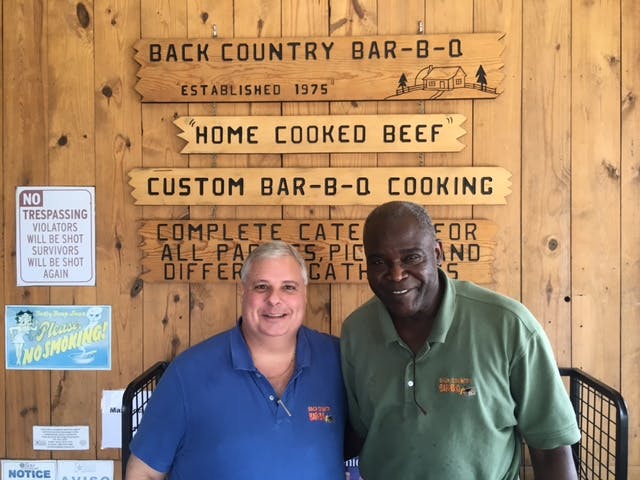
DV: You don’t look 62.
EG: It ain’t no stress being married to the same woman. I started smoking when I was 16 and quit when I was 35. Barbecue is my life. I like just playing around the meats. I just get a kick out of it.
DV: There have been some additions to the menu here since Scott took over.
EG: Yes, the beef ribs, That’s the best thing to happen. I cook them for the first couple hours, then I wrap them in plastic and foil and put them back on the pit. It gets them tender. It’s all about taking the time, that’s why I don’t let these guys cook nothing.
DV: After all these years in barbecue, do you have anything left to learn?
EG: You always got a lot to learn. Now they come out with these new terms like burnt ends. It’s when you take the lift off that brisket. You trim it down and put it back on the pit to brown.
DV: The lift?
EG: That’s the top cut.
DV: Like the point, or the fatty end?
EG: Yep. Joe Moseley got smart one year. The burned edges of the brisket, he would cut it up and put it in sauce. He’d give it to the customers. That went a long way. They were getting something for nothing, even though it was already paid for. A little incentive goes a long way.
DV: You’ve been cooking barbecue for almost fifty years. That’s quite a career.
EG: Yes. I’ve been blessed to have worked at the same place for so long.
DV: Do you cook barbecue at home?
EG: I don’t have a grill at home. I don’t have nothing there, and don’t come up to my house talking about barbecue. I’ve got a George Foreman grill at home that I cook steaks on. My wife got it for me for Christmas.
- More About:
- Black BBQ


